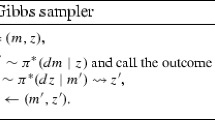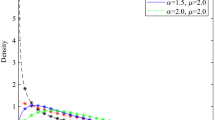Abstract
The exchange Monte Carlo (EMC) method was proposed as an improved algorithm of Markov chain Monte Carlo method, and its effectiveness has been shown in spin-glass simulation, Bayesian learning and many other applications. In this paper, we propose a new algorithm of EMC method with Gibbs sampler by using the hidden variable representing the component from which the datum is generated, and show its effectiveness by the simulation of Bayesian learning of normal mixture models.
Access this chapter
Tax calculation will be finalised at checkout
Purchases are for personal use only
Preview
Unable to display preview. Download preview PDF.
Similar content being viewed by others
References
Hukushima, K., Nemoto, K.: Exchange Monte Carlo Method and Application to Spin Glass Simulation. Journal of the Physical Society of Japan 65(6), 1604–1608 (1996)
Nagata, K., Watanabe, S.: Exchange Monte Carlo Sampling from Bayesian Posterior for Singular Learning Machines. IEEE Transactions on Neural Networks 19(7), 1253–1266 (2008)
Robert, C.P., Casella, G.: Monte Carlo Statistical Methods, 2nd edn. Springer, New York (2004)
Watanabe, S.: Algebraic analysis for nonidentifiable learning machines. Neural Computation 13(4), 899–933 (2001)
Yamazaki, K., Watanabe, S.: Singularities in mixture models and upper bounds of stochastic complexity. Neural Networks 16(7), 1029–1038 (2003)
Author information
Authors and Affiliations
Editor information
Editors and Affiliations
Rights and permissions
Copyright information
© 2009 Springer-Verlag Berlin Heidelberg
About this paper
Cite this paper
Nagata, K., Watanabe, S. (2009). Design of Exchange Monte Carlo Method for Bayesian Learning in Normal Mixture Models. In: Köppen, M., Kasabov, N., Coghill, G. (eds) Advances in Neuro-Information Processing. ICONIP 2008. Lecture Notes in Computer Science, vol 5506. Springer, Berlin, Heidelberg. https://doi.org/10.1007/978-3-642-02490-0_85
Download citation
DOI: https://doi.org/10.1007/978-3-642-02490-0_85
Publisher Name: Springer, Berlin, Heidelberg
Print ISBN: 978-3-642-02489-4
Online ISBN: 978-3-642-02490-0
eBook Packages: Computer ScienceComputer Science (R0)





